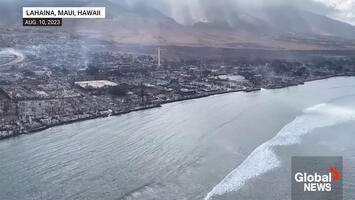
At the latest count, more than 100 people died in the Maui fire that also burned most of the town of Lahaina. The blame for this fire can be traced directly to Hawaii’s 62-year-old land-use law, which was written to protect Hawaii’s agricultural industry but had the opposite result.
The land-use law divided the state into urban and rural zones and heavily restricted development of the rural areas. As the state’s population grew, Maui’s median home prices rose from about 3 times median family incomes in 1969 to 7.9 times median family incomes in 2021. Any prices above 5 times median incomes are unaffordable since banks won’t approve a mortgage for a home that costs that much more than a family’s income.
The stated goal of the land-use law was to protect Hawaii’s agricultural industry from urban sprawl. But high housing prices made it impossible for Hawaiian farmers to hire the help they needed as people earning farmworker pay couldn’t afford to live in Hawaii. As a result, most Hawaiian farms went out of business. Between 1982 and 2017, according to USDA’s 2017 Natural Resources Inventory, the number of acres in Hawaiian crop production declined by 72 percent as sugar cane, pineapple, and other crops moved to other tropical countries that didn’t have self-inflicted housing crises.
Hawaiian native vegetation is fairly fire resistant. Farm crops are also fire resistant, partly because farmers burned their fields every year or so. But when the farms were abandoned, the vegetation that replaced them wasn’t native vegetation but invasive grasses. These non-native grasses had been introduced as cattle feed when farming was still active, and when the farms went out of business, they took over the former crop and pasture lands.
The above video also blames the fire on drought and winds. But drought and winds have been a fact of life in Hawaii for centuries. What’s new is the hundreds of thousands of acres of rural lands that were once resistant to fires but now are highly flammable.
Many press reports point to the non-native grasses in ex-farms as the problem — but they don’t go the next step and ask why the farms shut down in the first place, allowing the non-native grasses to take over. This was solely because of the land-use law that was supposed to save the farms.
Once the land-use law was written, it became impossible to change it even when some people realized that it was killing, rather than saving, the agricultural industry. Too many people benefited from the law, whether it was property owners in the cities who saw the values of their land skyrocket or people who considered themselves environmentalists who were convinced that sprawl was evil and open space should be protected at any cost. Just as a U.S. Army officer supposedly once said in Viet Nam, “It became necessary to destroy the town to save it,” many Hawaiian environmentalists still believe they had to destroy Hawaii’s farms in order to save them.
Since the media rarely, if ever, pointed out that the land-use law was the reason why farms were going out of business, people persuaded themselves that other factors were at work. If Hawaiians knew that the reason Lahaina was destroyed and at least 93 people are dead was the land-use law that backfired, would they demand changes to the law? Repealing that state law (and subsequent amendments) and repealing the federal Jones Act (that makes shipping from the mainland U.S. to Hawaii inordinately expensive) are the two most important things the state and nation can do to help Maui recover and prevent such disasters in the future.
This piece first appeared at The Antiplanner.
Randal O'Toole, the Antiplanner, is a policy analyst with nearly 50 years of experience reviewing transportation and land-use plans and the author of The Best-Laid Plans: How Government Planning Harms Your Quality of Life, Your Pocketbook, and Your Future.
Photo: screenshot from video The Antiplanner.













breaking out of the MSM script
Few disasters have only one cause, but I would like to hear further discussion of this factor by economists. Perhaps in due time?